When I saw Michael Rohd and Shannon Scrofano speak at PSU some months back, I fell into an instant love-hate relationship with them. A very fast-paced relationship, after such a brief, not very intimate encounter. I was intrigued by their bringing socially engaged artwork into the realm of theater/dance theater/performance theater/physical theater/performance art - it crossed all of those boundaries and more. I was annoyed at their presentation, however, for treating us, the audience, like we had never seen a theater project that went off stage to incorporate the audience. Plus, they had even more energy than I. Yikes. After a more intimate gathering after the lecture, however, I was fairly sold that I should check their work out.
"On the Table" is a multi-course piece about sense of place, belonging, inclusion and exclusion. When purchasing tickets, I had to choose if I'd like to start in Portland or Molalla. Where's Molalla?
Act 1: Our experience started in a church-turned-theater in NE Portland, just blocks from my house. We sat in an oval while the 'players' played their parts; of former Portland inhabitants, and of themselves. While playing themselves they were awkward and self conscious, making an argument for Portland's awesomeness, which I care to question. But we became accustomed to the ins and outs of the characters, real and imagined, and we then moved on to our anticipated bus trip to the country. I had some images of haystacks in my mind, as there were some scouting shots presented when they spoke of the piece during its development.
Act 2: On the bus we were given a performance-cheer by a new group of young performers. It was too loud to hear them, but I think we were asked to discuss our sense of "home" and "place" with our neighbors on the bus, which we did. That's a big one for me, having recently moved after a very long stint. We stopped at the Oregon City Amtrak station and witness a faux marriage, and were promptly invited to a wedding. We then were asked to turn on our phones, and many of us received phone calls from an unknown individuals, presumably those who started in Molalla, whom we couldn't hear because the old school bus was just too loud. Nice idea though.
Act 3: A high-perched parking lot in Oregon City dimly lit with warm candlelight, a groovy band playing, and Michael Rohd himself inviting us to think about what we were about to do. The players, integrated at our tables with assigned seating, brought up issues of potential difference and intolerance that one might have to deal with at a wedding, or at our table. What if there were a logger and an environmentalist sitting together? What if there were a vegan and a hunter? And so the list went on. We were asked to discuss these issues with our table. We were obviously set up for a potentially difficult situation here. We sat next to an old couple from Molalla, a middle aged couple from Portland, and a young twosome- not sure of their status, from Molalla. The player at our table facilitated our discussion while we ate a symbolic tasting menu, family style. I actively engaged my older Molalla neighbors, Mel and Melanie, who heard about the project at their local carpet store. They were used to going to see community theater fairly regularly. When our facilitator, I think his name was Joel, tried to engage us in conversation, it was the Portlanders that immediately responded and engaged. We all talked about tolerance and humility, and I used my family as an example. I brought up the struggle to simultaneously take a stance and be tolerant. Finally I asked the Molallans to chip in. The young guy at the other end of the table broke his silence. "I don't care what you think, frankly". "You do what you do and let me do what I do. That's why I live in the country without any neighbors, so I can live my life how I want." Mel piped in: "It's the American way". Joel or our other Portland neighbors suggested it was the Pioneer spirit. The divide between us was thick yet somehow light-spirited and friendly. Our facilitators publicly exclaimed our sentiments as we went back into theater mode for a moment. Then I was tapped on the back, asked by a man if my number was (510) ... . It was the man who had called earlier. He was a Molalla resident, a retired auto mechanic. We chatted about ourselves for a few minutes until his wife and I, along with the rest of the crowd, were led around the other side of the parking lot to witness a final dance way down below us. We clapped, said our goodbyes and got back on the bus.
I wasn't sure again. Had this been self conscious, overbearing, didactic art with some symbolic niceties or did something remarkable just happen?
I don't have the answer, but I have been thinking about it, and about my sense of home, and about the brief yet straightforward meeting we had with the residents of Molalla ever since... .
Wednesday, August 4, 2010
Subscribe to:
Post Comments (Atom)
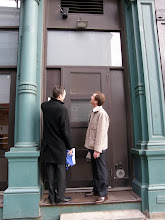
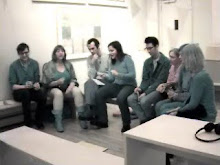
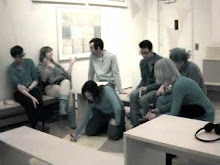
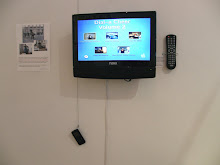












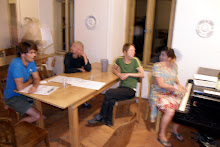

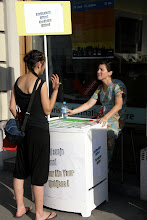
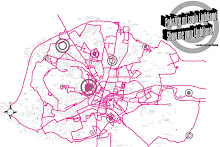




No comments:
Post a Comment